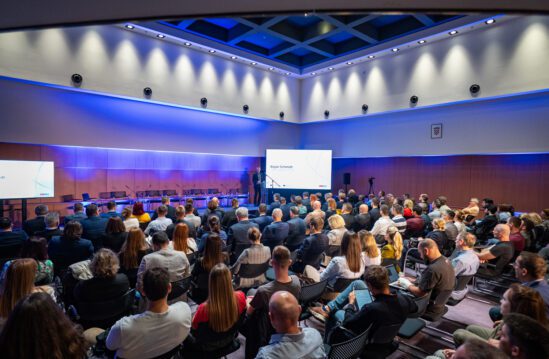The Croatian Quantum Communication Infrastructure Project – CroQCI represents a foundation for building a modern infrastructure aimed at protecting the national critical infrastructure, including government institutions, key service operators, and digital service providers, from emerging cyber threats. With a total value of 9.9 million euros, the project is co-funded equally by the Digital Europe program and the National Recovery and Resilience Plan.
The CroQCI project involves the implementation of an experimental infrastructure for Quantum Key Distribution (QKD) via a fiber-optic network and establishes the prerequisites for future space connectivity. This will allow the national strategic communication infrastructure to be upgraded for more secure information exchange. The project also plans to connect Croatia’s quantum communication infrastructure with similar infrastructures in neighboring EU member states and fully integrate it into the future EuroQCI network.
The Republic of Croatia has recognized the importance of the European Quantum Communication Infrastructure (EuroQCI) initiative and, in 2019, signed the Declaration on European Quantum Communication Infrastructure, committing to activities aimed at building a secure quantum communication infrastructure covering the entire European Union. Today, the initiative includes all EU member states, working on the design and development of national quantum communication networks, as well as the European Space Agency, which is responsible for the space component.
“The primary goal of the quantum communication network we are developing through the CroQCI project is to lay the foundation for more secure network communication. In an era of increasing reliance on digital services and network-based communication, the risks of cyberattacks aimed at stealing sensitive data are significant. It is anticipated that with the advent of higher-performance computers, current protection mechanisms for network communication will be insufficient, and attackers are already collecting and storing encrypted network traffic containing sensitive data to decrypt it in the future. With the arrival of quantum computers, serious compromises in the security and confidentiality of data protected by traditional encryption methods can be expected. This applies to most network traffic on the internet, and is especially concerning in the case of sensitive data in sectors such as finance, healthcare, energy, transportation, and more. Therefore, a new paradigm for digital protection must be found, and quantum technologies in quantum communication networks are emerging as one of the solutions for ultra-secure data protection,” emphasized project leader Bojan Schmidt, head of the department for the application and integration of new technologies at CARNET.
The national CroQCI consortium is composed of key national research and scientific institutions, higher education institutions, public institutions, and public companies. The project coordinator is the Croatian Academic and Research Network – CARNET, with scientific leadership from the Ruđer Bošković Institute. Partner organizations include the University Computing Centre of the University of Zagreb, the Institute of Physics, the Faculty of Electrical Engineering and Computing at the University of Zagreb, the Faculty of Transport and Traffic Sciences at the University of Zagreb, Transmitters and Communications Ltd., and the Office of the National Security Council.
The transfer of knowledge between the research community and partner institutions will enable the production of components, devices, and software for the application of new quantum technologies. This will have a significant impact on encouraging the use of high technology and fostering economic growth, not only in Croatia but also in the broader European context. The demonstration of QKD within the project will provide opportunities for education and training in quantum communication technologies, enhancing readiness for the design and implementation of the next generation of highly secure communication networks.



